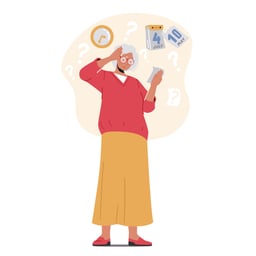Stigma around dementia are assumptions made about someone because they have a diagnosis of cognitive impairment. When a person in your life is diagnosed with dementia, it can be an overwhelming, frightening and isolating experience. The more we learn about the symptoms of dementia, and how best to communicate with someone with dementia, the less we draw on incorrect assumptions.
This article will highlight the warning signs and types of dementia.
Warning Signs of Dementia
It is quite common to occasionally forget an appointment, leave an item off the shopping list, or even forget the name of an acquaintance. As we age, our memory and recall tend not to be as sharp. Dementia, on the other hand, is cognitive decline, of which the most common type is Alzheimer's. Here are some warning signs outlined by the Alzheimer's Association. 
- Memory loss severe enough to disrupt daily life, including asking the same questions over and over, forgetting important dates, and increased reliance on memory aids.
- Having difficulty planning, such as keeping track of bills or following a familiar recipe. Working with numbers can become a particular challenge.
- Difficulty completing familiar tasks, such as having trouble driving to a familiar location or remembering the rules of a game.
- Losing track of the date, seasons, and passage of time, forgetting how you got somewhere.
- Difficulty determining color or contrast, judging distance. Alzheimer's can cause vision problems.
- Difficulty following or joining conversations, repeating themselves frequently, using the wrong names for things.
- Putting things in unusual places, losing things, and accusing others of stealing.
- Decreased judgment, less attention to hygiene.
- Withdrawing from work or social activities, having difficulty keeping up with a favorite team.
- Changes in mood and personality.
It's important to distinguish this from normal changes. For example, a normal, healthy senior may occasionally "misplace" a word and have to search for it, but are unlikely to do so repeatedly or use an incorrect word.
Types of Dementia
Dementia is a symptom, not a disease. Here are the two most common types of dementia.
Vascular Dementia
Vascular dementia is caused by damage to the brain, most often from a stroke or from a series of transient ischaemic attacks (TIAs) or mini-strokes. It may also be caused by a traumatic brain injury after an accident or fall.
Vascular dementia may cause similar symptoms to dementia, though it can also cause other symptoms including slowness of thought, difficulty planning, concentration difficulties, depression, balance issues, loss of bladder control, and delusions and hallucunations. The exact symptoms depend on the part of the brain that is damaged. Vascular dementia can be severe or it can be extremely mild.
Lewy Body Dementia
Also called LBD or dementia with lewy bodies, lewy body dementia is caused by abnormal deposits of alpha-synuclein in the brain. LBD typically is not associated with memory problems until it is advanced. There are other symptoms which may include visual hallucinations, changes in concentration and alertness, and severe loss of cognitive abilities. Many also experience movement challenges and or sleep disorders. Symptoms can vary widely from person to person.
Some individuals have mixed dementia, which means they have two or more types of dementia.
Conditions That Can Cause Dementia-Like Symptoms
 Dementia can be progressive and irreversible. However, dementia and dementia-like symptoms may be caused by other problems. For example, here are a few conditions:
Dementia can be progressive and irreversible. However, dementia and dementia-like symptoms may be caused by other problems. For example, here are a few conditions:
- Huntington's disease, a genetic disorder that causes a severe decline in cognitive skills.
- Traumatic brain injury, which can cause vascular dementia but may also cause more temporary problems.
- Creutzfeld-Jakob disease, a prion disease that is fatal and causes rapid cognitive decline.
- Parkinson's disease.
There are also some treatable/reversible causes of dementia which include:
- A high fever.
- Thyroid problems.
- Low blood sugar.
- Imbalance of sodium or calcium
- Problems absorbing B-12, or insufficient intake of B-12. The latter is more common in vegetarians and vegans.
- Chronic alcoholism.
- Copper and vitamin E deficiencies
- Medication side effects
- A subdural hematoma, which is bleeding on the brain and is common after a fall.
When you notice a decline in your or a loved one cognitive ability is important to consult your doctor. Symptoms and causes vary and viable treatments. For example, your doctor may identify a vitamin deficiency such as B-12 which is treatable and managed by one's doctor and dietary changes.
Dementia is progressive and consulting with your doctor and help you and your loved one understand and prepare as needed.
LifeSpring Community provides caring services for long-term care, short-term care, and future service offering meaningful memory care at Grace Garden..
Contact us to learn more about LifeSpring caring services and schedule a tour.


